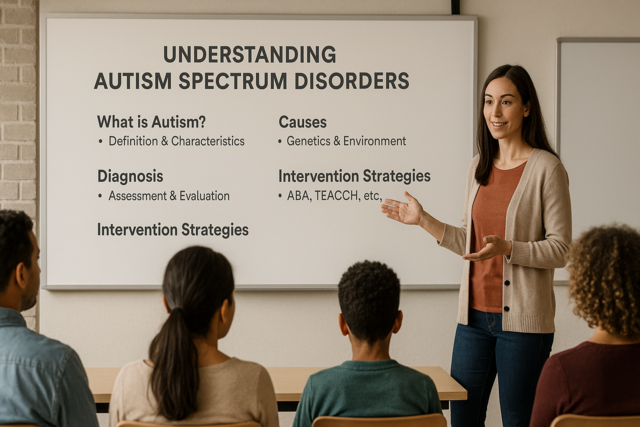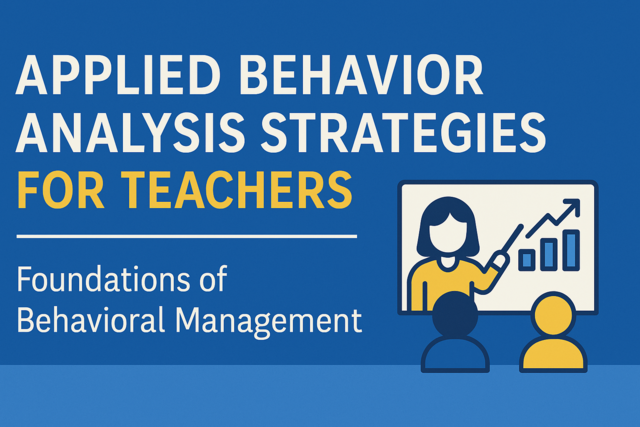Autism Spectrum Disorders for Teachers
Empowering Educators: Unlocking Potential in Every Spectrum

Embrace this comprehensive training to unravel the complexities of ASD and its spectrum. Dive deep into the latest research, practical intervention strategies, and innovative educational planning, all designed to empower you in crafting personalized learning experiences that resonate. Witness firsthand the transformative power of techniques like Applied Behavior Analysis and the TEACCH Model as they flourish in cultivating communication, independence, and growth.
What makes this course truly unique is its blend of cutting-edge knowledge and a heartfelt approach, arming you with not just the "how," but the profound "why" behind supporting students with Autism. Enroll now, and begin your journey to becoming an empathetic and empowered advocate, ready to unlock potential and foster success in every child's story.
9 Hours average completion time
0.9 CEUs
10 Lessons
11 Exams & Assignments
102 Discussions
71 Reference Files
94 Articles
Mobile Friendly
Last Updated January 2026
Understanding Autism Spectrum Disorders (ASD): Comprehensive Training for Educators and Paraprofessionals
With the prevalence of Autism Spectrum Disorders (ASD) increasing globally--estimated to affect 1 in 54 children in the U.S. according to the Centers for Disease Control and Prevention (CDC)--the need for educators and paraprofessionals to be well-equipped with the knowledge and skills to support these individuals has never been more vital. This course offers a comprehensive insight into the multi-faceted world of ASD.
Course Overview:
Delve into the intricate details of disorders under the autism spectrum such as Asperger's syndrome, Rett's disorder, childhood disintegrative disorder, and more. Gain a deep understanding of their psychological, physiological, social, and educational implications.
In the initial segments of the course, we set the foundation by focusing on the definition, diagnostic criteria, potential causes, and the significance of early intervention and meticulous program planning. With recent research revealing the potential involvement of both genetic and environmental factors in the onset of autism, this section ensures participants have a thorough grasp of the latest findings.
Moving on, the course unravels evidence-backed intervention strategies such as Applied Behavior Analysis (ABA) and the TEACCH Model. For instance, explore the success stories of ABA in enhancing communication skills and reducing negative behaviors in children with ASD. Further, delve into the TEACCH Model's structured teaching approach and its positive impact on enhancing independence and organization in students.
The concluding lessons focus on the pragmatic aspects of education for students with ASD. Learn the art of designing effective learning goals, both short-term and long-term. Additionally, master the Individualized Education Program (IEP) form--a pivotal tool in special education--and the nuanced process of crafting a detailed lesson plan tailored for students with autism.
Course Goals:
By the culmination of this course, participants will:
- Comprehend the definition and varied characteristics of individuals with ASD.
- Understand the potential causes and the latest statistics on the prevalence of autism.
- Be adept in the assessment techniques and discern appropriate education placements for students requiring special education services.
- Be proficient in various intervention strategies.
- Expertly craft learning goals and objectives tailored for students with ASD.
- Navigate the IEP form, understanding its significance and components.
- Skillfully design a lesson plan keeping in mind the unique needs of students with autism.
Snapshot of Lessons:
- Introduction: Setting the stage for the journey ahead.
- Definition and Characteristics of Autism: Dive into the unique behavioral, communicative, and social patterns.
- Causes of Autism: Explore the genetics, environment, and current research breakthroughs.
- Diagnosis and Assessment of Autism: Understand tools, techniques, and best practices.
- How to Write Short-Term Objectives: Creating measurable and achievable milestones.
- How to Write Long-Term Goals: Visionary planning for holistic development.
- How to Write an IEP: Structuring individualized plans with a focus on inclusivity.
- How to Write a Scripted Lesson Plan: Precision in crafting lessons for optimized learning.
- Types of Intervention Strategies: An insight into evidence-backed approaches.
- ABA and Positive Behavior Supports: Harnessing behavioral principles for change.
- TEACCH Model: Structured teaching for enhanced independence and organization.
Why This Course?
The world of education is ever-evolving, and with the rising prevalence of ASD, it becomes imperative for educators and paraprofessionals to be on the cutting edge of knowledge and skills related to autism. This course ensures you are not just informed but empowered to make a real difference in the lives of students with ASD.
Join us in this comprehensive exploration and prepare yourself to be an effective and empathetic advocate for students on the autism spectrum.
- Crafting individualized education programs skillfully
- Employing structured teaching for independence
- Understanding autism's diverse psychological characteristics
- Implementing evidence-based intervention strategies
- Advancing students' social interaction skills
- Enhancing communication through ABA principles
- Utilizing diagnostic tools for effective assessment
- Fostering inclusive learning environments
- Designing personalized lesson plans
-

Personality Development
-

Behavior Management 101
-

Business Management
-

Applied Behavior Analysis Strategies for Teachers
-

ABCs of Physics
-

How to Teach Reading Fundamentals
-

Understanding Addictions
-

Understanding Childhood Obesity
-

Journalism 101
-

Building Self-Esteem in Children
-

Autism 101
-

Criminology: The Anatomy of American Justice
-

How To Be a Substitute Teacher
-

End of Life Care
-

Energy Healing
-

Memory and Concentration Techniques
-

Emotional and Behavioral Disorders
-

Acrylic Painting
-

Negotiation Skills
-

Positive Parenting Techniques
-

Public Relations 101
-

First Grade Curriculum
-

Financial Analysis 101: Planning and Control
-

Second Grade Curriculum
-

Kaizen 101 - An Introduction
